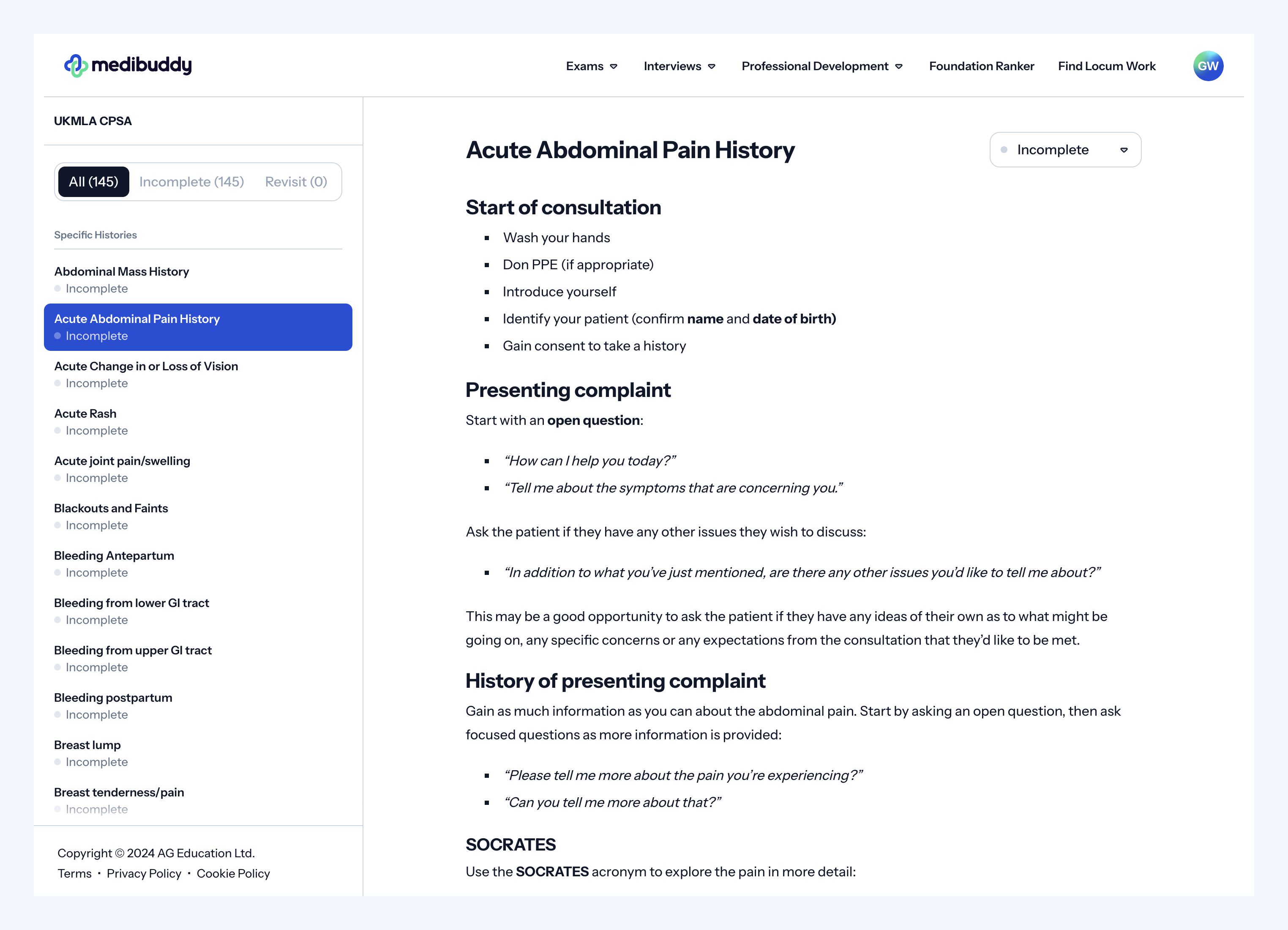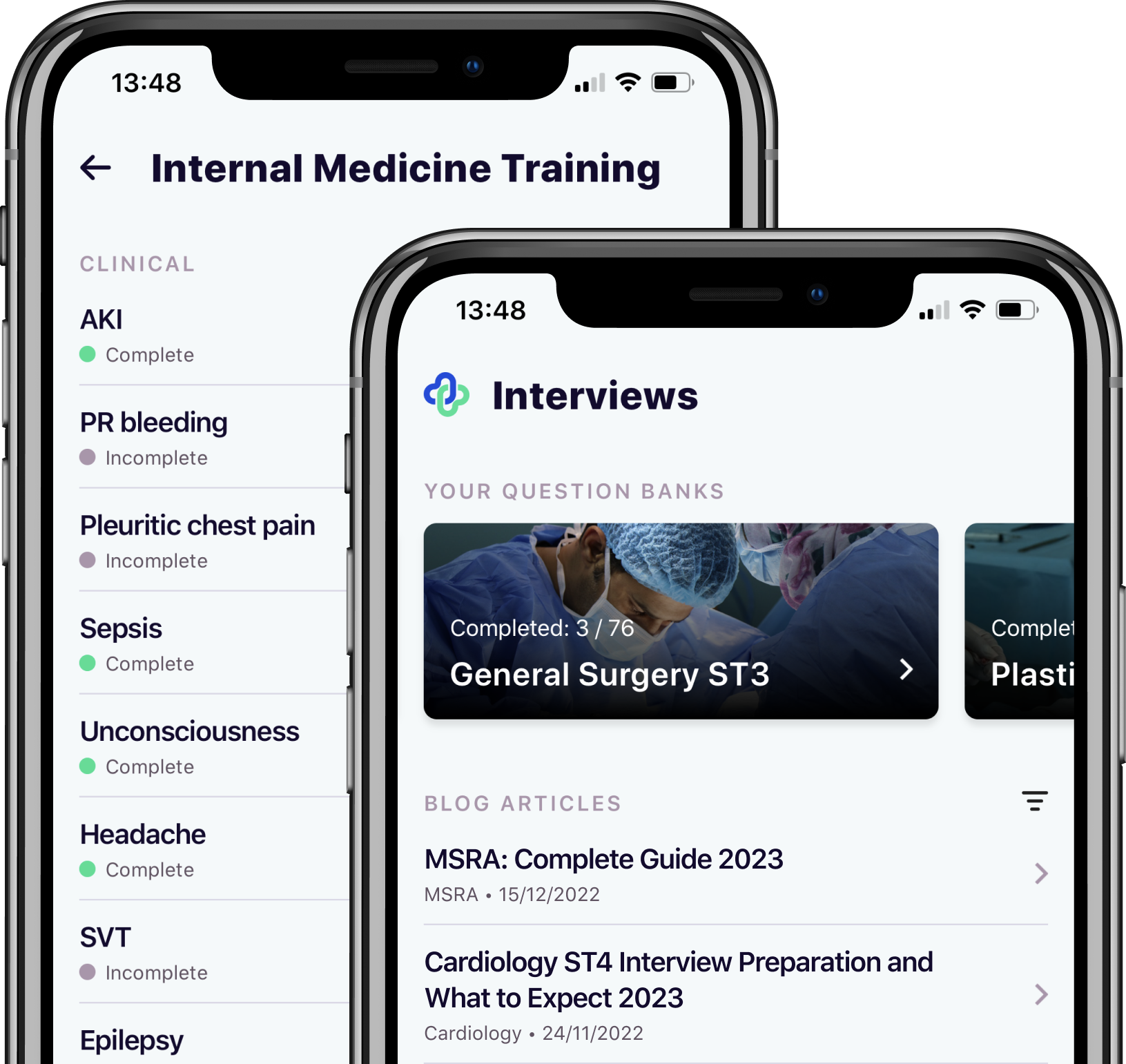
MLA: A guide to the CPSA
The Clinical and Professional Skills Assessment (CPSA) makes up one component of the new two-part Medical Licensing Assessment (MLA). The exam is being introduced by the General Medical Council (GMC) for all UK medical school graduates and international medical graduates who wish to register for a licence to practise medicine in the UK. The MLA will ensure a common and consistent threshold against which to assess the skills needed for safe practice in the UK.
If you’re a UK medical student graduating in the academic year 2024-25 or later, you will need to pass the MLA as part of your medical degree before you can join the medical register. This guide will provide you with everything you need to know about the CPSA section of the MLA. We also have more information about the exam in our MLA Guide which we’re updating regularly as new information becomes available from the GMC.
If you’re an international graduate who is currently required to pass the PLAB (PLAB 1 & PLAB 2) before you can apply to join the UK medical register, we have all the information you need about how the introduction of the MLA will affect you in our PLAB and MLA Guide.
Do you need to take the MLA?
Our MLA AKT question bank and MLA CPSA question bank, designed specifically to match the exam syllabus, can help!
The MLA syllabus differs from old-style medical finals or the PLAB.
Ensure that any question bank provider you use hasn’t just changed the name of their old question bank. Medicine is vast, and you may waste considerable time revising topics not in the MLA.
All providers should be able to give you a breakdown of exactly how their question bank matches the MLA content map. Find ours here.
What is the CPSA part of the MLA?
The MLA is a two-part exam made up of the following:
Applied Knowledge Test (AKT)
This will be an on-screen, multiple-choice exam, assessing your ability to apply medical knowledge to different scenarios. You can find more information about the AKT – including the clinical areas which are assessed, when you will take the AKT and how to prepare – in our Guide to the AKT.
Clinical and Professional Skills Assessment (CPSA)
This will be a practical, performance-based assessment of your clinical and professional skills, knowledge and behaviours. For UK medical students, your CPSA will be set and delivered by your medical school.
You may see the CPSA referred to as something else, for example, an Objective Structured Clinical Examination (OSCE) or Objective Structured Long Examination Record (OSLER), as some medical schools use different names. Regardless of what it’s called, your CPSA will need to meet the same requirements as all other UK medical schools, as set by the GMC.
What topics does the CPSA cover?
As mentioned above, all CPSAs must meet specific requirements set by the GMC. These have been developed in collaboration with medical schools and with the support of independent assessment experts.
The MLA content map outlines the core knowledge, skills and behaviours needed for practising in the UK, and those which you will be assessed against in the CPSA.
The CPSA is mapped against the content map’s three overarching themes:
- Readiness for safe practice
- Managing uncertainty
- Delivering person-centred care
In addition to this, it must also cover the individual domains:
- Areas of clinical practice
- Areas of professional knowledge
- Clinical and professional capabilities
- Practical skills and procedures
- Patient presentations
- Conditions
You can find a breakdown of what’s included in each of these in the MLA content map. For the CPSA, pay particular attention to the ‘clinical and professional capabilities’ and the ‘practical skills and procedures’ sections.
Is the CPSA similar to current OSCEs in medical school finals?
Yes, the CPSA is a practical exam like the OSCEs (or similar) which are currently taken in medical school finals.
What’s more, the MLA content map, which sets out the topics that could be assessed in the CPSA, is based on the GMC’s Outcomes for Graduates. This document outlines the requirements for newly qualified UK graduates, in terms of what they must know and be able to do, and every UK medical school needs to ensure that their graduates are meeting these outcomes.
As your medical school is already preparing you to meet the GMC’s Outcomes for Graduates, the topics covered by your medical school and likely to be assessed in any current OSCEs, should be similar to those in the MLA content map, and subsequently the CPSA exam.
Preparing for the Medical Licensing Assessment CPSA
Advice from the GMC states that your medical degree is the best preparation for the MLA and you don’t need to learn anything beyond what is covered in the curriculum.
Remember, the MLA content map outlines the topics and areas which could be assessed in the CPSA. This can be used to guide your preparation, helping you to identify any areas which you may need to develop further and providing topics to practise from.
Although it is a new exam, don’t forget what you would usually do for OSCEs or any other practical exam to help you to prepare. Practising with others – using the content map topics – will help you to gain practical experience and build confidence for the exam.
MLA CPSA question bank
A question bank can be a really valuable addition to your CPSA preparations, providing you with station topics and detailed explanations to help you demonstrate your clinical and professional skills, knowledge and behaviours during the exam.
While the MLA content map, with its ‘A-Z of presentations’, is useful for identifying topics to revise, a question bank can then help you prepare for each of these. For example, the MLA content map lists “Acute Abdominal Pain” as a presentation on which you may be assessed. Using a question bank can help you revise how you would approach CPSA stations relating to this, like in the example given below:

Example of a CPSA specific history from the Medibuddy MLA CPSA Question Bank
A high-quality MLA CPSA question bank should cover all topics and areas listed in the MLA content map. Our comprehensive MLA CPSA question bank has been mapped against the MLA content map and designed specifically to cover all elements of the exam, helping you to prepare effectively for the CPSA.
When will I take the MLA CPSA?
If you’re a UK medical student due to graduate in the academic year 2024-25 and onwards, you’ll take the exam in the penultimate or final year of your medical degree.
Dates for the MLA CPSA will be determined by your medical school. It’s likely that this will be in line with when your medical school currently sets finals, as it’s planned that the CPSA will be integrated into the existing finals (following a process of quality assurance to ensure that GMC requirements are met).
If you’re an international medical graduate, you will still be required to pass the PLAB at this stage and will not need to take the MLA. However, from 2024, the PLAB blueprint was replaced with the MLA content map to make it compliant with the requirements of the MLA. You can find more information in our MLA Guide.
Where will the CPSA be held?
UK medical schools will deliver their individual CPSAs; therefore, if you’re a UK student you will complete your CPSA at your medical school or a place of their choosing.
As mentioned above, international medical graduates will continue to take the PLAB rather than the MLA for the time being. PLAB 2 exams, which became equivalent to the CPSA in 2024, are held in one of two GMC assessment centres in Manchester, UK.
How is the MLA CPSA scored?
Both parts of the MLA – the AKT and CPSA – are pass/fail assessments.
For UK medical students, your CPSA will be set, delivered and assessed by your medical school. This means the MLA CPSA scoring is determined locally, by individual medical schools, rather than nationally. However, all CPSAs need to meet the GMC requirements and will be quality assured by the GMC for quality, consistency and fairness. Additionally, your medical school will need to provide rationale for their approach to scoring.
How many people fail the CPSA?
As the MLA is a new exam, there are no figures showing how many people fail the CPSA. However, a good marker is to compare it to the PLAB 2 pass rates, as this is soon to be the equivalent exam to the CPSA.
For 2024, the percentage of candidates who passed the PLAB 2 was 65.8%. In the last 5 years the pass rate percentage has consistently been below 70%.
The introduction of a new exam, especially one of this importance, can be stressful. As one of the first cohorts set to take the MLA, trying to find answers and accurate information – particularly as further changes are made – can be a challenge. Hopefully this guide has answered any questions you may have about the CPSA. We also have you covered with a MLA Guide and AKT Guide, which we’ll continue to update as more details become available, to ensure you have the most up-to-date information out there.

Take your subscriptions with you
Our mobile app allows you to access your interview and exam question banks wherever you are.



